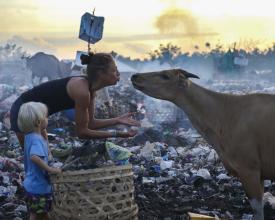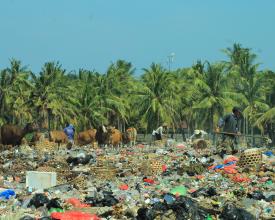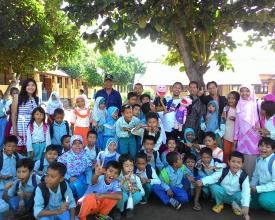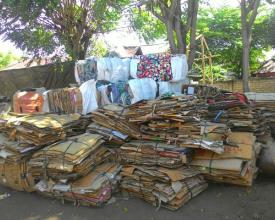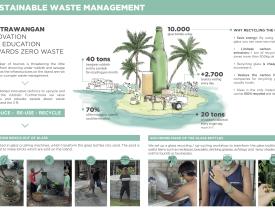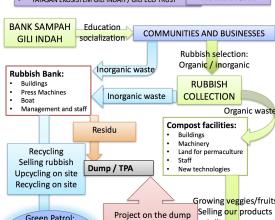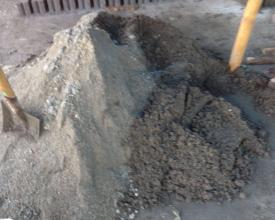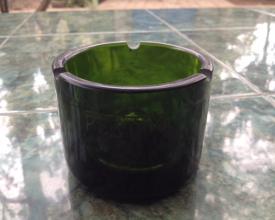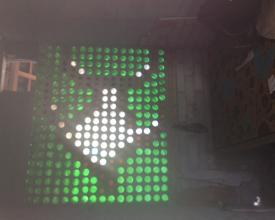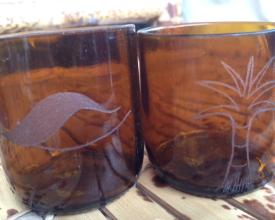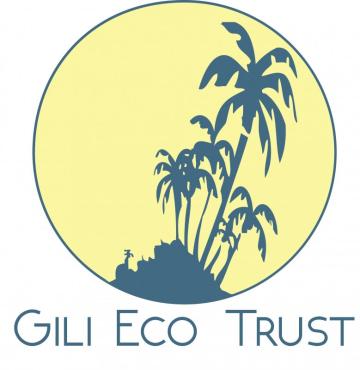
Waste Management in very Touristic Area: Gili Trawangan Innovation and Education towards Zero Waste

Gili Trawangan is a touristic little island in the north of Lombok, Indonesia. For the last 15 years, tourism has “exploded” from about 10,000 tourists a year, we are now over a million of tourists visiting Trawangan every year. All these tourists come to enjoy the paradise island without pollution as no car and no motorbike, and to enjoy the turquoise waters to swim, snorkel and scuba dive.
But in reality the development of the businesses and the number of tourists is dangerously threatening the little paradise from drowning under rubbish and sewage pollution as the infrastructures on the island are not in place for a proper management of the 20 tons of rubbish collected every single day. Lombok and Gili have now been hit by series of earthquakes and we want to take this opportunity to start over with waste management towards eco-tourism.
The Gili Eco Trust is actively involved in recycling, upcycling, education and sustainable solutions to local communities for a better future.
Context
Challenges addressed
When working with waste and local communities, the first challenge is to make people responsible of their own waste. While working with so many differents kind of people, we have to find a way of educating everyone at their different social level as well as with their different life style. The Green Patrol with the Eco rangers should be able to adapt tools, educational tools as well as demonstration depending on their "students": stakeholders, local communities, employees, owners, expats...etc
With constant eyes on the island (Green Patrol), we want to make sure no more illegal dumping happens, all the waste should end in the sorting facilities and not on empty land polluting land, well water and oceans.
For the success of the Green Patrol, we need a good team of Eco Rangers with local people feeling responsible of the future of their island but also willing to teach people for a real change. The budget for the green patrol with at least 10 eco rangers is still a big challenge for us.
Location
Process
Summary of the process
This project is an integrated project with many actions, short and long term goals, and many people, businesses and communities involved. This project is a combination of many projects and actions to ensure that zero waste goal is reach for Gili Trawangan. We want to combine raising awareness and education of the local communities and tourism businesses how to be sustainable in terms of waste management, soil and reef restoration, use of local facilities and solutions in place.
The buildings blocks interact as the glass upcycling project is our way of reducing the amount of solid waste ending up on the landfill. Without the glass upcycling projects, which are running for the last 6 years, our "dump" or landfill would have been about 3 times the size it is actually. Everything about waste is connected and interact with one another. Waste selection from its source is the key to success for our project and we think it can only work with repetitions of the waste selection education.
If everyone select their waste according to our 5 categories, then there is no glass waste on the dump (all transformed and upcycled) and the anorganic rubbish can be selected again to reduce the amount of residu.
Building Blocks
Waste Collection and Management
Waste collection and Management in Gili Trawangan has been managed locallly since 1999. The Gili Eco Trust is actively involved since 2004 with FMPL (Front Masyarakat Peduli Lingkungan) to handle waste collection, management, recycling, upcycling, educating and decreasing the amount of waste ending up on a landfill. Since 2014, waste collection and solutions for the waste that cant be recycled (Residue) have been discussed and put in place with the local Government, and district Government. Working together to collect daily rubbish from more than 700 places (hotels, resorts, restaurants, local market, private houses...etc), and to dispose it in one place only: TPA or landfill in Gili Trawangan. Progressively, this association has made progress to transform rubbish, to recycle more items and to find innovative ideas to reduce the residue. Now, we want to make the island a real example of sustainability and eco tourism by educating everyone living, working or spending holidays on Gili Trawangan how to select their rubbish properly according to our 5 categories, and also consuming differently, and feeling responsible of the future of their island.
We think that by offering daily waste collection and education we can make a change for Gili Trawangan.
Enabling factors
Team of new employees to be part of rubbish collectors and eco rangers who teach / educate everyone on Gili Trawangan about waste selection for a better management of the waste.
walkie talkies to ensure good communication between waste collectors and eco rangers, for fast reaction and daily door to door education
Rubbish selection from its source would need investment from businesses and solutions from us for local communities to make different coloured bins
Facilities buildings: sorting and recycling
Barge to transport recyclables to main land
Lesson learned
We learned a lot about waste and what is possible to recycle in Indonesia.
We have learned a lot about upcycling glass bottles and finding solutions to be locally applied. We have learned that anything about waste should involve education and raising awareness for successful and sustainable future. But it cannot be done with just one event for education, this is why the eco rangers will be checking how everyone select their waste, every day on a door to door pattern: how to select rubbish according to our 5 categories and how to reduce the residue or what ends up on the dump.
Daily personal education to local communities and tourism businesses done is the key to success to reduce the amount of waste being disposed on landfill but also to ensure that the changes of habits towards waste change faster than during 2 generations.
Facilities to recycle and pack (press machine) with a lot of employees to garantee that all anorganic rubbish is recycled at his maximum
Working with government and local communities, businesses and association is also the best collaboration for success
Upcycling glass bottles on a touristic and party island of Gili Trawangan
The Gili Eco Trust created a service and product in 2012 that stays within a circular economy that not only increased employment opportunities in waste management on Trawangan for the local community, but started to drastically reduce the size of the landfill, whilst offering beautiful handmade unique personalized products to businesses and tourists alike. On top of this, all glass that can’t be upcycled into new glassware, crockery and gifts, gets crushed into a sand, which is then used in the production of bricks (mixing glass sand, fresh water, a bit of glue and cement). The "glass sand bricks" are then sold on Gili Trawangan for buildings. This means that 100% of all glass waste produced on Gili Trawangan can then be used in other projects, to reinvent this originally single use material as a valuable product once more. Using these different techniques, not only providing employment to the local community in the fast growing waste management sector, we are reducing the amount of glass going to landfill and educating the local businesses why and how they can separate all of their waste to create a zero waste to landfill initiative.
Enabling factors
The success of this building block is the combination of projects that garantee that glass waste is fully reused, recycled and upcycled, and do not end up on the landfill. Only local beer bottles (BINTANG) are refilled, all the other glass bottles, jars are all ending up on the dump, with no future except piling up. To enable these glass projects, we learned about glass upcycling and invested in machinery to cut, polish and crush the bottles. We trained 5 people to be safely handling glass and now they are proud of their projects.
Lesson learned
Our sole intention of our glass upcycling campaigns is to limit the amount of glass making it to landfill, now that we have proven that we can recycle 100% of glass waste we create. We used to received glass waste from neighbour island, Gili Meno. So we decided to teach them with training in glass cutting and upcycling. We also donated them a glass crushing machine to aid their independent work. This demonstrates that these campaigns can be shared, expanded and work in many different locations giving local communities a source of income and solution to previously unrecyclable and undegradeable waste.
- Upcylcing glass bottles into glass ware and glass sand
- Protecting material for our employees to not breathe glass dust
- Educating local communities about possibilities of upcycling glass bottles / jars
- Marketing and promoting our upcycled glassware and glass sand bricks for a revenue from waste.
- Empowering local communities with new skills and jobs from waste
Impacts
Our solution will impact the whole island as it grows its network through the Green Patrol and Gili Green Award, more and more people will be aware of our goals and objectives, and the facilities are on the island too to see the type of waste, how much recycling is done, and how much residue is left. How many hotels would sign in the Gili Green Award is the key for us to establish a global network of consciousness for the best future of Gili Trawangan.
It will impact not only the environment because the waste will be selected and disposed properly, but it will impact the local communities and the tourists who will proudly say that they have learned about the waste selection and how to reduce their consumption of single use plastic.
Tourism will be impacted too, the island will become an example of eco and green tourism for the rest of Indonesia. Businesses on the island will be able to market Gili Trawangan as a green and eco destination where everyone is working together for a greener future.
Repetitive education is our way to garantee the success of waste management towards zero waste. Waste selected from its source with aware communities will make sure the amount of waste going to landfill is reduced at its lowest amount.
Eco pledge for tourists, daily education and checks, Gili Green Award, rubbish bank, Trash App: all projects combine towards zero waste as a main impact
Beneficiaries
local communities
tourists
Stakeholders and tourism activities
Government
local associations
near by island and all Indonesia as we want to scale up our system to many locations
Sustainable Development Goals
Story
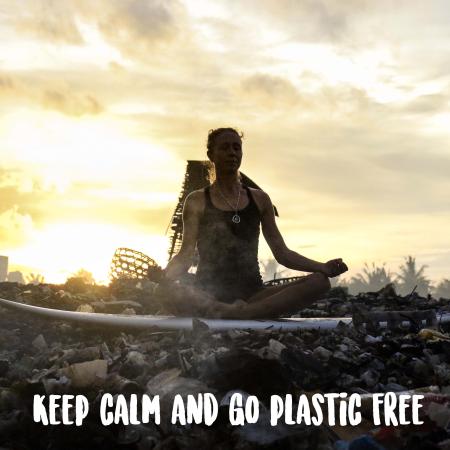
After creating a base of waste management in a sustainable and educational way with a complete network with all Gili Trawangan businesses and communities, we would like to expand our projects for even more recycling and upcycling, composting a bigger volume of organic waste with more land and being able to start some bigger permaculture projects, more people trained so the project can be replicated in other islands in Indonesia and all over the world. We would also expand our projects to tackle the marine pollution through disposable plastics by working with more communities in Lombok which would collect rubbish instead of dumping in river beds and littering all over the primitive island. So free workshops will be organised for each villages and communities.
Our long term goal will be to use the awareness & traction we have generated through this project to raise additional funding for the implementation of some locally empowered eco-rules such as: banning plastic bags and plastic straws and encouraging refill water stations rather than buying disposable water bottles.
The well being and the future of this island and making it sustainable is my job, my dream and my life goal. I will be working full time on that project to manage the combination of projects that we have put in place and that we want to expand. I will need to delegate to be successful, so I will hire new people who help me manage all these actions and becoming bigger for larger in terms of networking and creating an example. Our goal is to educate as many people as possible, with repetitive education and raising awareness about our environment, waste, sewage, solutions, we hope to get many people feeling responsible of their impacts as well as some becoming true eco warriors to help their island become an eco example of green tourism integrating education towards sustainability and zero waste.
